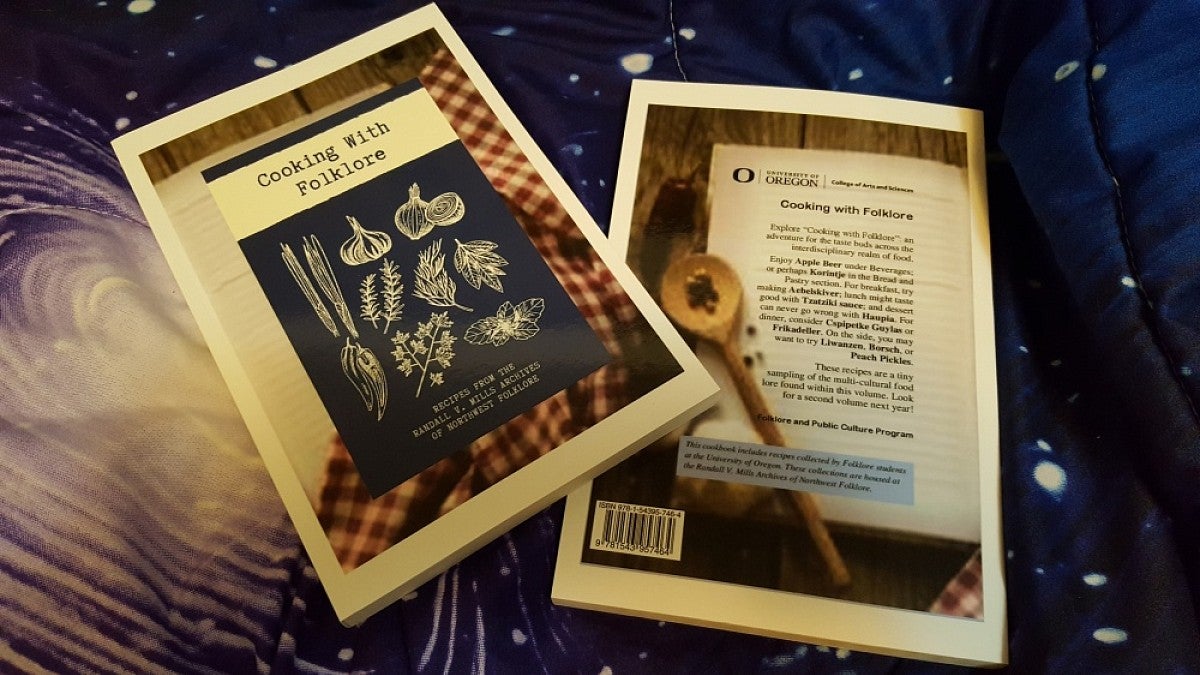Anyone interested in whipping up a batch of apple beer or fart tarts need look no further than the UO Folklore and Public Culture Program.
The program recently published its first cookbook, “Cooking with Folklore: Recipes from the Randall V. Mills Archives of Northwest Folklore,” which takes readers across the globe and back through time with more than 100 curated recipes steeped in lore.
The recipes often are collected by students in the course of doing research for the program. Folklore students are often tasked with retrieving text, photos and videos through interviews or from family or friends. Items that students collect are then stored in the folklore archives on campus.
Former folklore graduate student Jennie Flinspach was archiving student work last year when she noticed a high number of recipes going into the system. Flinspach mentioned the idea to folklore department head Doug Blandy, and the folklore cookbook was born.
“Most cookbooks are made by professional chefs, and this is being submitted by people from their parents, from their grandparents and from their great-grandparents,” said folklore archivist Sarah Fisher. “When you have that feeling that only your grandma makes this one dish that one way — and everybody else’s is wrong — that recipe could be in this book.”
After collecting more than 300 recipes from the database, Flinspach worked with Fisher and fellow student archivists Alia Kempton and Christal Snyder to edit and publish the cookbook. So many recipes were compiled that a second edition is already planned for December 2019.
For almost a year the team worked hard to get permissions from the original authors as well as to translate, edit and digitize recipes dating to the 1970s.
Each recipe includes who collected the recipe, who shared the recipe, the year of collection, the location of the recipe and a file number. All recipes can be found in their original state in the folklore archives by following the file number in the book.
“We tried to keep the language as close to the original writing as possible so that it gets that authentic feel,” Fisher said. “We didn’t want to make it sound like we wrote it, because we didn’t; we just proofread it and edited it.”
Many of the recipes also include collector’s notes to give readers context on the heritage and stories of the dish. The cookbook covers a variety of recipes including apple beer, peach pickles, fart tarts and barbecue sauce, taking readers from Japan to Norway.
“On this one I tried to keep it kind of even; there were a lot of desserts,” Fisher said. “So the second edition is going to be a lot of desserts, but this one is kind of evened out between the categories.”
The cookbook can be purchased online for $20 plus shipping through bookbaby or in person at the folklore archives by contacting the archives department. All sales of the book go to support folklore program funding.
Students and faculty members have a chance to learn about folklore cooking today, Feb. 22, at 11:45 a.m. at a food talk with English professor Martha Bayless in Room 249, Columbia Hall titled “Medieval Bread: Making and Meaning.” Bayless will discuss the history and cultural importance of medieval bread as well as how to make it.
“When we feel more divided than ever I think that’s one of the great things about folklore is that it shows us the ways that we are the same,” Flinspach said. “It helps us to see what makes us unique but also highlights what makes us alike.”
To learn more about the Randall V. Mills Archives, visit its website. To read more about Bayless’ food talk see the folklore announcement webpage.
—By Bryan Dorn, University Communications


